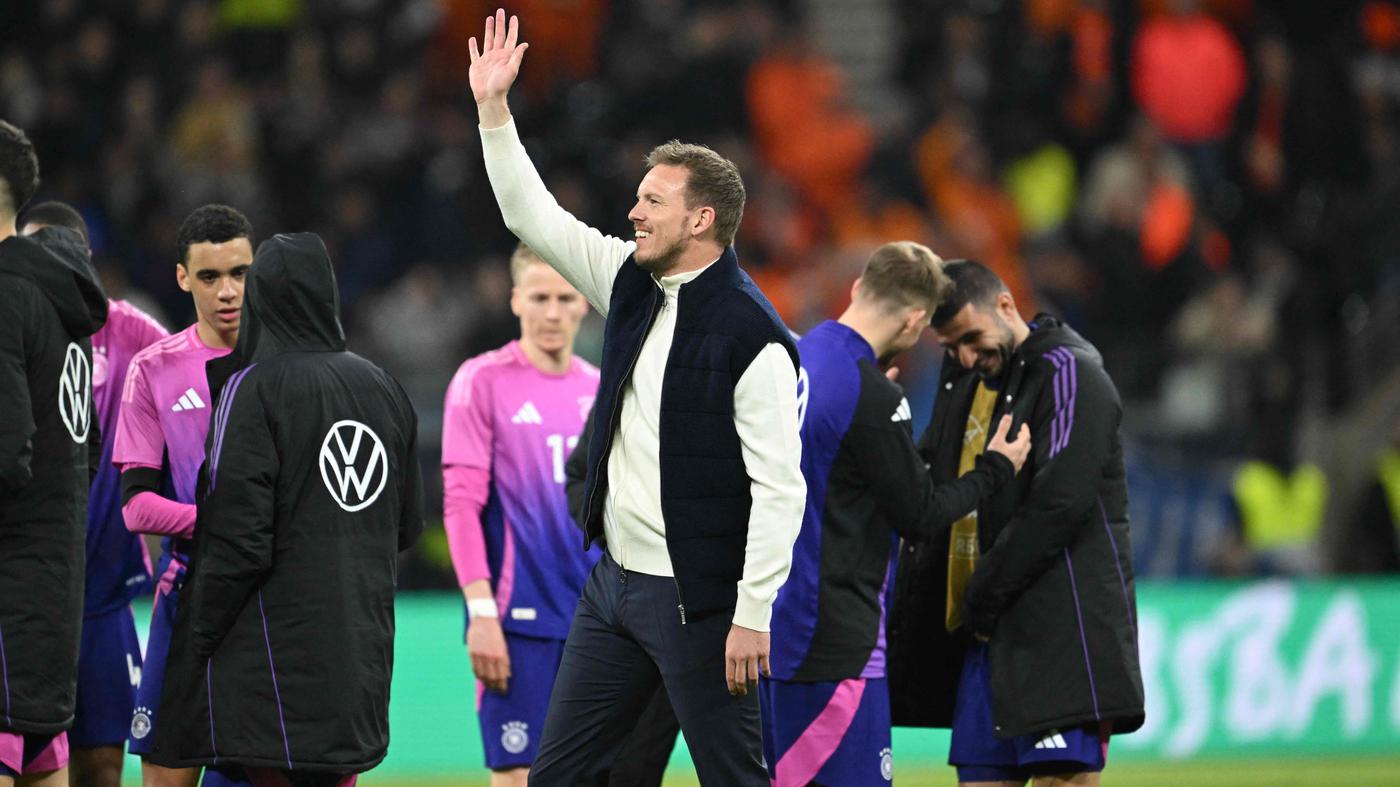There were some shining winners in the Frankfurt stadium on Tuesday evening. There were Jamal Musiala and Florian Wirtz, who once again showed Football Germany that they function better with than without each other on the pitch. There was returnee Toni Kroos, who played as if he had never been away, or newcomer Maximilian Mittelstädt, who showed significantly more ups than downs in his performance.
But the biggest winner of the evening was national coach Julian Nagelsmann. Since taking office in September, the 36-year-old has repeatedly dared to break with traditions and supposed taboos. In this last international break before the European Championship in his own country, he probably took the biggest risk with a completely restructured squad. He has now been rewarded for this courage with victories against France (2:0) and the Netherlands (2:1).
Nagelsmann managed to identify weaknesses in the German national team and clearly identify them. Externally, but also internally. In recent years, role models have rarely been spoken of so frequently within the German national team, at least in external perception. Nagelsmann made important and difficult decisions in all positions and communicated them sustainably to his players.
Starting in goal, where he has now decided on Manuel Neuer as number one and is sticking to it, even though Neuer was injured and couldn’t play in any of the test matches. Marc-Andre ter Stegen will probably only remain in the reserve role at the next big tournament. But he has shown in the two most recent games that he can and wants to fill this role.
In defense, the national coach chose Antonio Rüdiger and Jonathan Tah in central defense. Only injuries could change that until June. There is currently no central defensive player who could replace either of them. The closest is Waldemar Anton, who, unlike Robin Koch, at least got a few minutes of playing time.
He was outstanding. The best thing is, he’s a completely normal guy, an incredibly nice guy, friendly, always in a good mood.
Julian Nagelsmann about Maximilian Mittelstädt
In the full-back position, Nagelsmann seems to have solved probably the biggest problem of the past for the German national football team with Joshua Kimmich and Maximilian Mittelstädt. Both played well, but Nagelsmann had special praise for Mittelstädt. “He was outstanding. The best thing is, he is a completely normal guy, an incredibly nice guy, friendly, always in a good mood,” said Nagelsmann.
The VfB Stuttgart player made a misfire that led to the goal being conceded, “but then he shot the thing into the corner from 18 meters.” In this form, Mittelstädt was an option for the national coach for the first team at the European Championships. And Mittelstädt? “I would be happy if I were there,” said the Berlin native. “Now it’s time to confirm my performance at VfB,” he said.
© dpa/Federico Gambarini
Toni Kroos’ return to the double six had a hugely positive effect. Both Robert Andrich and Pascal Groß presented themselves as good additions to him. The previous series with captain Ilkay Gündogan, Jamal Musiala and Florian Wirtz also harmonizes better from game to game. Of this trio, Gündogan probably still has the most room for improvement.
Nagelsmann had announced that, as long as all players remained fit, he would only make one or two changes to the European Championship squad.
Leroy Sané will return to the national team
One of them is likely to be the nomination of Leroy Sané. “He is exceptionally good. He knows what it means to play a home European Championship. He has to integrate himself into this functioning group,” said Nagelsmann and added: “I am convinced that Leroy puts his qualities 100 percent at the service of the team. And there’s no way we’re going to miss out on that if he’s healthy.”
Kai Havertz was initially placed at the front in both games and impressed with his variability. While Niclas Füllkrug acts as a classic striker who usually waits for his chances to score, Havertz can also create plays with the ball or deep running routes. Since both variants worked, this allows Germany a certain degree of unpredictability in attack for upcoming opponents.
After the ten days of this suspension period, Nagelsmann was now very satisfied with his team’s performance. “It was a very good mix between a very good relationship, but also brutal ambition, even in training,” he said. “But not everything was perfect. We don’t fall into hysteria and only see everything positively, but there are great things to analyze.” Nevertheless, he is above all hopeful about the home European Championships. “Because the spirit was completely different than it was in November.”
